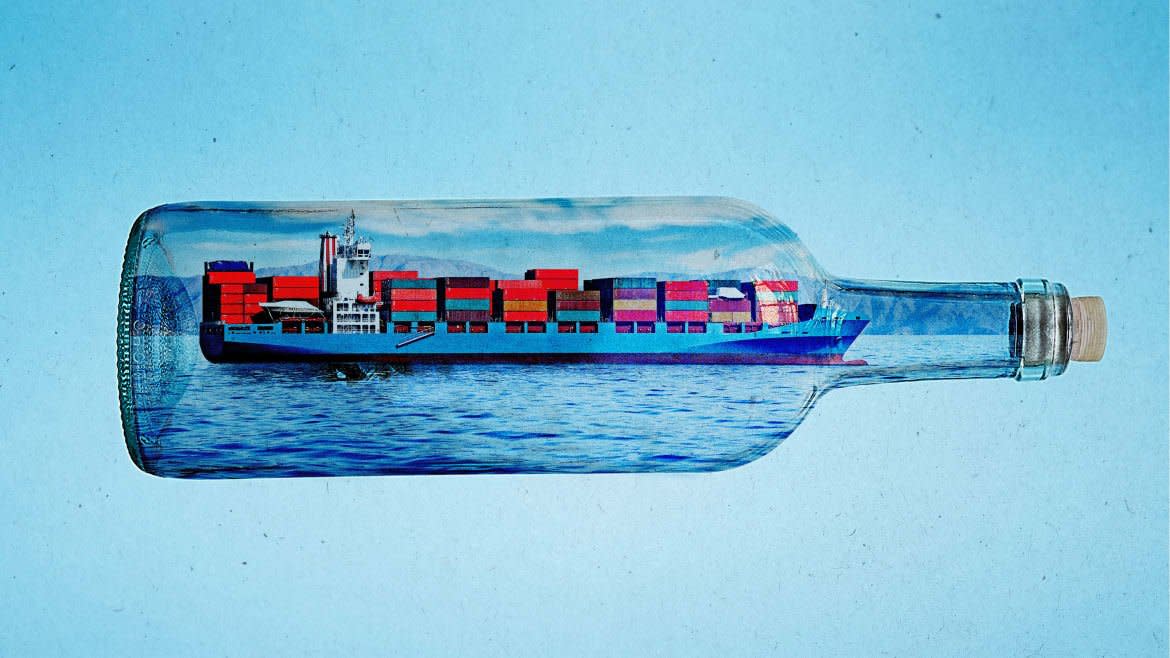The Supply Chain Problems Ruining Happy Hour

The first time I met David DeFazio, in 2014, he was proudly introducing Wyoming Whiskey, the state’s first bourbon since Prohibition. DeFazio and his partners had put care into not only the liquid but also its packaging, creating a custom bottle with the company’s name stamped into the base of the glass, intended to look like something that might have existed a century ago.
The company’s bottle has become so beloved that some Wyoming restaurants reuse it as a water pitcher, but now they’ll have to find an alternative.
How the Margarita Became a Cocktail Sensation
The Past, Present and Future of Rye Whiskey
In late November, Wyoming Whiskey announced that it was temporarily changing its bottle to a squatter, more generic shape—with no custom embossing—because its supplier wasn’t able to fulfill orders. “We have been suffering a windfall of demand through COVID,” says DeFazio. “We can’t lose that momentum. The two options were, find a stock bottle or go out of stock.”
Wyoming Whiskey isn’t alone. As shortages of glass and other materials continue, coupled with extensive shipping delays and skyrocketing freight costs, many spirits producers have been forced to find alternatives for their usual packaging.
Last year, America’s oldest licensed distillery, New Jersey-based Laird & Company, started using generic bottles for some of its legendary applejack and apple brandy. It did add a neck tag to explain the brand’s different appearance.
In addition to making its own spirits, Laird’s provides contract bottling for other brands, many of whom are experiencing their own shortages. “The U.S. industry has always produced on a just-in-time manufacturing basis and with COVID shutdowns they’ve never been able to catch up,” says the company’s executive vice president Lisa Laird Dunn. She adds that larger producers are buying up inventory—as well as buying out whole production days at glass manufacturers. “The small distillers—we’re the ones who are really getting hurt because we don’t have that muscle,” she says.
But distillers of all sizes are feeling the impact of glass shortages, according to Lisa Hawkins, senior vice president of public affairs at the Distilled Spirits Council of the United States (DISCUS). “Some distillers have had to seek out new suppliers or change the size of their glass bottles due to the shortages,” she says, adding that such moves “often require a change to labels, closures, and packaging.”
Some companies, like Heaven Hill, whose portfolio includes Evan Williams Bourbon, Deep Eddy Vodka, and Lunazul Tequila, have begun allocating spirits and delaying releases to ensure continuous—if limited—availability. “We have had to make tough choices among line extensions within a brand to determine which line extension we will bottle and ship on time given glass supply,” says Heaven Hill’s vice president of supply chain Cindy Mouser.
Pernod Ricard, which owns brands like Absolut Vodka, Jameson Irish Whiskey, and Malibu Rum, has scrambled to keep its spirits on shelves through concessions, like canceling planned holiday gift packs of glassware with a bottle, as well as switching from custom to generic bottles when necessary. “It’s the difference between an empty retail shelf and a well-stocked one,” says Melissa Hanesworth, vice president of North America manufacturing at Pernod Ricard.
Some distillers, however, are being forced to make tougher choices, including discontinuing products. Several liqueurs made by Leopold Bros. in Denver are packaged in shapely green Calvados-style bottles from French producer Saverglass. When the pandemic first started, Leopold Bros. anticipated potential shortages and ordered as many bottles as it could in advance, which kept things going until late 2021. But with a two-year backlog on new orders, Leopold Bros. has now switched some liqueurs to taller, clear glass bottles while completely phasing out other, less popular flavors such as coffee and sour apple.
While not ideal, co-founder Todd Leopold admits that the company was already considering some of these changes before the pandemic. “This just made it a hell of a lot easier, and it certainly makes the conversation easier with your customers because there are some that are obviously disappointed and it’s like—nothing we can do.”
Predictably concurrent with the shortages are rising costs for both materials and shipping, which are now showing up at the checkout counter. Though Laird’s held out for as long as it could, the company has increased prices on some of its spirits. “We have no choice,” says Laird Dunn.
Spirit Works Distillery in Sonoma, California, which temporarily switched from custom to generic bottles in 2021 due to shipping delays, has watched expenses spiral across its supply chain. “We haven’t changed our pricing since inception” a decade ago, says co-founder Timo Marshall. “Literally every supply bill that is going past my desk now is increasing dramatically, and so we’re finally having to make decisions about what our pricing looks like moving forward.”
Even in the most optimistic scenarios, the impact from shortages will stretch on for months. DISCUS says it is unable to make predictions about when the constraints might ease. Wyoming Whiskey has no idea when it will be able to source supply of its custom glass, even though it has an outstanding order that is now more than six months delayed. “We don’t have any faith that we’re going to see it anytime soon,” DeFazio says.
While Laird’s has been able to get some custom bottles back in stock, “it’s still a perpetual problem,” says Laird Dunn. “Nothing’s written in stone until I actually have it in my warehouse.”
La Dolce Vita: The Birth of Italian Cocktails
How to Avoid Overhyped and Overpriced Bourbon
Get the Daily Beast's biggest scoops and scandals delivered right to your inbox. Sign up now.
Stay informed and gain unlimited access to the Daily Beast's unmatched reporting. Subscribe now.

